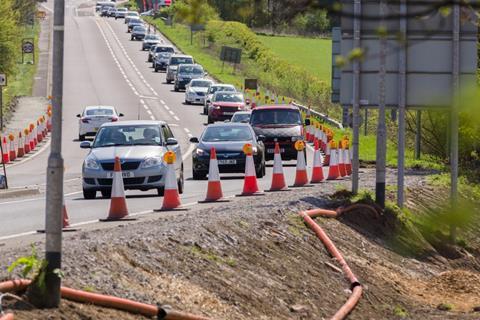All future road schemes will have to pass tough environmental tests
The Welsh government has scrapped a number of major road building projects in the country after a year-long review into their impact on the climate.
More than 50 schemes were reassessed, with only 15 now set to go ahead in their original form, with others amended, postponed or scrapped.

Schemes in the latter category include changes to the A483 around Wrexham, the proposed third Menai Bridge linking Anglesey and the mainland and the controversial ‘red route’ scheme in Flintshire, where a new road threatened ancient woodland.
Deputy climate change minister Lee Waters told the Senedd yesterday that Wales would not reach net zero if it continued “doing the same thing over and over” and said the new National Transport Delivery Plan would put it on a “new path”.
He continued: “Let me be very clear at the outset, we will still invest in roads. In fact, we are building new roads as I speak – but we are raising the bar for where new roads are the right response to transport problems.”
All future roads must now pass strict criteria which mean they must not increase carbon emissions or the number of cars on the road, lead to higher speeds or negatively impact the environment.
Haf Elgar, the director of Friends of the Earth Cymru, called the policy “world-leading”. She said: “This is a breath of fresh air that promises a greener and fairer transport system in Wales. The response of the Welsh government shows they are serious about tackling the climate emergency.”
Director of the Civil Engineering Contractors Association, Ed Evans, said: “It’s a huge announcement, there’s no two ways about it.
“What we’ve just been through has created uncertainty, but we can start to get clarity on investments in infrastructure, whether that’s maintaining what we’ve got or new investment in energy for instance, then that will go a long way to ensure that jobs, business and communities are safeguarded.”
Keith Jones, director of the Institution of Civil Engineers in Wales added: “There is no plausible path to net zero without significant transport emissions reductions – reductions that need to start being delivered soon.
“Transport accounts for 17% of Wales’s total carbon emissions, primarily from road vehicles. Globally, governments face difficult policy choices around constraining road transport demand without disadvantaging economic growth, certain geographies, industries, or populations.
“We need to invest in the ageing public transport asset base and low-carbon transport options to make the shift from cars practical and desirable. New road schemes will also need to consider how to manage the network more effectively rather than just adding capacity.
”The decision by the Welsh Government reflects these challenges, however it is essential that a wider assessment of the transport system takes place to set out plans for improving public transport and active travel options.”


























No comments yet